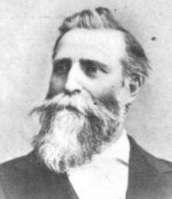Marcus Ames
Marcus Ames (1828–1887) was an American minister and prison chaplain who was an early reformer in juvenile corrections. A member of the Ames family, he served as head of the Lancaster Industrial School for Girls and as chaplain of the state institutions of Rhode Island.
Marcus Ames | |
|---|---|
 | |
| Born | 1828 |
| Died | 1887 (aged 58–59) |
| Citizenship | United States |
| Occupation | Minister |
| Title | Reverend |
| Spouse(s) | Jane Ames (née Vandenburg) |
| Relatives | Herman Vandenburg Ames (son) |
| Family | Ames family |
Early life
A member of the Ames family, Marcus Ames was the son of Azel Ames and Mercy Ames (née Hatch).[1][2][3] He was educated at Phillips Andover Academy, where he graduated as valedictorian, before studying medicine at Harvard Medical School.[4][5][6]
Career
He was ordained to the clergy in 1854, becoming a "brilliant, fervent, and impressive" Congregational preacher who ministered throughout Massachusetts.[6][7] Though Ames was educated to undertake missionary work in West Africa, the poor state of health of his wife ultimately precluded him from traveling abroad.[6]
Ames was a firm believer in criminal rehabilitation and, in 1862, was made superintendent and chaplain of the Lancaster Industrial School for Girls.[7] Two years later he expressed, in writing, his concerns for what he saw as a growing problem with a lack of skilled education, and prevalence of idleness, among working class girls, and opined that without education many would be destined for unemployment and homelessness.[8] In 1874, after plans were announced to install workshops at the school, Ames – concerned that the new direction towards prison industry was transforming it into a jail – resigned in protest.[8][9][10] His resignation was joined by most of the school's matrons.[8][9] After leaving the Lancaster School, he was appointed chaplain of state institutions of the State of Rhode Island, which included the state's insane asylum, prison, almshouse, and workhouse.[11]
Personal life
With his wife, Jane Ames (née Vandenburg), Ames had two sons, Marcus and Herman, and a daughter, Ella.[3][6][12]
References
- Shaw, Albert (1901). The American Monthly Review of Reviews, Volume 24. p. 121.
- Register. Order of the Founders and Patriots of America. 1902. p. 41.
- White, Almira (1909). Genealogy of the descendants of John White of Wenham and Lancaster, Massachusetts. Nicholas Print. pp. 60–64.
- Chamberlain, Joshua (1901). University of Pennsylvania: Its History, Influence, Equipment and Characteristics; with Biographical Sketches and Portraits of Founders, Benefactors, Officers and Alumni. R. Herndon Company. p. 442.
- Hinman, Royal (1852). A Catalogue of the Names of the Early Puritan Settlers of the Colony of Connecticut. Case, Tiffany. p. 50.
- Ford, David (1899). History of Hanover Academy. 1899: H.M. Hight. pp. 164–165.CS1 maint: location (link)
- Adoniram, Rich (1869). Historical Discourse Delivered on Occasion of the One Hundred and Twenty-fifth Anniversary of the Congregational Church, and the Fiftieth Anniversary of the Sunday School, in Westminster, Mass., September 9, 1868. S. Bowles. p. 124. Archived from the original on February 18, 2018.
- Brenzel, Barbara (1985). Daughters of the State: A Social Portrait of the First Reform School for Girls in North America, 1856-1905. MIT Press. pp. 108, 114.
- Lawrence, Richard (2008). Juvenile Justice. SAGE. pp. 356–357. ISBN 1412950368. Archived from the original on 2018-02-18.
- Schneider, Eric (1993). In the Web of Class: Delinquents and Reformers in Boston, 1810s–1930s. NYU Press. p. 89. ISBN 0814788785. Archived from the original on 2018-02-18.
- The Social Welfare Forum: Official Proceedings [of The] Annual Forum. National Conference on Social Welfare. 1881. pp. 215–216. Archived from the original on 2018-02-18.
- Dictionary of American Biography. New York: Charles Scribner's Sons. 1943. pp. 28–29.